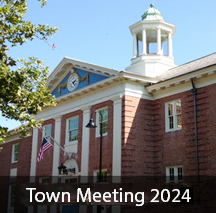 Resident Barbara Peskin recently submitted three public records requests to the town in connection with the controversial March 23 Annual Town Meeting vote on Housing Choice Act rezoning.
Resident Barbara Peskin recently submitted three public records requests to the town in connection with the controversial March 23 Annual Town Meeting vote on Housing Choice Act rezoning.
Town administrator Tim Higgins received the requests under the Massachusetts Public Records Law on April 5. Peskin confirmed that she had made the requests but declined further comment. Her specific requests seek emails, files, and communications regarding the March 20 Moderator’s meeting (see “Groups will get time to present positions” subheading) and Article 3 at the March 23 Town Meeting that were shared among town officials including Planning Board and Select Board members, Town Meeting Moderator Sarah Cannon Holden, Director of Planning and Land Use Paula Vaughn-MacKenzie, Assistant Director of Planning and Land Use Jennifer Curtin, Higgins, Assistant Town Administrator Dan Pereira, IT Director Michael Dolan, and “staff who support them.”
Peskin and a number of other residents were unhappy about how the zoning bylaw in the Housing Choice Act warrant article was presented and amended at Town Meeting. Questions were raised about who said what to whom and when regarding the amendment in the preceding days.
The public records law requires the town to provide its initial response within 10 business days. “When the scope of the request is extensive, the town responds with an estimate of the time and expense involved in searching and preparing its response,” Higgins said on April 23. “Once the fee is paid, the town undertakes the search and compiles its response. In the process, the town does review the records to determine whether any of the materials may be withheld or redacted pursuant to the exceptions that are spelled out in the statute. The requester is free to appeal the town’s decisions to the Supervisor of Public Records under 950 CMR 32.08 (1)(d). We are required to advise all requesters of their appeal rights when we send our response.”
Asked if he knew how much time and expense that meeting the process would involve, Higgins said on April 25, “We are in the process of working with the requester. Out of respect to the requester and the process, I would prefer not to comment on the request until the process is concluded.”
Perhaps not coincidentally, Vaughn-MacKenzie told Planning Board members on April 16 that they had to use their town-issued email addresses to discuss town government matters in the future. She also said that Town Counsel Joel Bard had advised that officials unsubscribe from LincolnTalk. However, it isn’t clear whether (1) officials must unsubscribe entirely (i.e., not be able to read posts to the listserv), or if they can post emails about non-town-related issues, and (2) if the recommendation applies to elected officials appointed officials, paid town employees, or all three.
On April 24, Higgins said he had spoken with Bard in an attempt to clarify what is permissible for board and committee members regarding listservs and social media, and that he would report on the issue at the Select Board meeting on April 29.
In the next-to-last paragraph of this story I assume you meant to say “use”, not “sue”.
This reflects the narrow passage of the article and the confusion that preceded it, esp. the “surprise” amendment offered at the front of the room, and a tactical decision to call a vote. The amendment was a well-played move by Article 3 proponents, and it was probably the tipping point for passage. Remember a 21 vote shift would have defeated the Article…not a sign of overwhelming support.
But, it seems signify the new MO- “winner takes all, and win at all costs” rather than “how can we seek consensus, compromise and a middle ground.” That used to be the key to a functional democracy-“Compromise, the coin of the realm.” It also meant more cohesion on our community-no more.
Whether the amendment was orchestrated last minute or not it was clearly orchestrated. The rlf (a private corporation with Financial implications at stake) representative jimped up and walked to the podium unannounced without asking Madam moderator permission and the slide went up immediately and then the detailed comments following by proponents were clearly well thought out and pertained directly to amendment details. It is very difficult to believe those comments all came off the cuff. Yes, definitely orchestrated and a low political maneuver that swayed the vote. It is Mickey Mouse allowing such a significant zoning by law to be amended on the floor with such little time for voters to process.
I have heard of a court, applying another jurisdiction’s FOIA law, ordering a search of private email when people subject to FOIA were avoiding their official mailboxes.